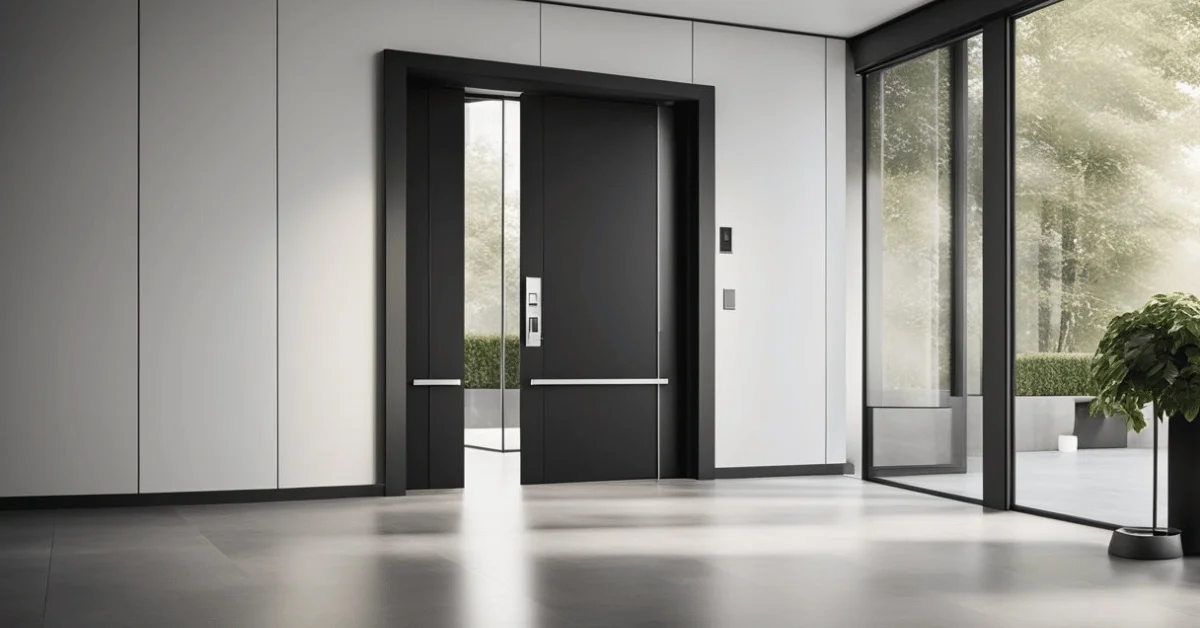In the world of interior design, minimalist modern door trim has emerged as a prominent feature that elevates the aesthetic appeal of homes and commercial spaces alike.
It is the embodiment of “less is more”—simplifying the doorway to its essential elements without unnecessary ornamental detail. This approach to door trim aligns with contemporary trends focusing on clean lines and uncluttered spaces, delivering an understated elegance.
As we consider the evolution of door trim, it becomes apparent that modern door trim strips away the complex profiles and conspicuous decorations of the past. Today’s trim designs advocate for a smooth transition between spaces, embracing a sleek and functional form.
Not only does minimalist trim complement a wide range of architectural styles, but it also offers a sense of continuity and flow within the interior, allowing other design elements to take center stage.
Incorporating minimalist door trim into a space requires a discerning eye for design and attention to detail. The selection of materials, the precision of installation, and the maintenance of these trims are crucial to achieving a refined look. While the installation may appear straightforward, achieving the perfect finish often necessitates professional expertise. When it comes to colors, the right hue can either blend with the wall for a seamless look or create a contrast that gently defines the boundaries of a room.
Key Takeaways
- Minimalist modern door trim emphasizes clean lines and functional elegance in interior design.
- It marks a shift from ornate to simpler trim profiles that contribute to a cohesive aesthetic.
- Selection, installation, and maintenance of door trim are key to the integration within modern interiors.
The Evolution of Door Trim Design
As we explore the evolution of door trim design, we’ll focus on how styles have shifted from the ornate to the understated, reflecting broader architectural trends and design philosophies.
Transition From Traditional To Modern
Traditional door trims were often characterized by elaborate designs. These included the ornate Victorian casing design, which was popular in the 19th century, with intricate patterns and deep reliefs. Over time, we saw a shift towards simpler trim profiles. This shift embodied the transitional phase where elements of the Craftsman style began to blend with more streamlined modern aesthetics. The transition marked a departure from the highly decorative trims towards efficiency and simplicity, hallmarks of modern design.
Traditional Trim Characteristics:
- Intricate patterns
- Deep reliefs
- More embellishments
Transition to Modern:
- Blend of Craftsmanship and modernity
- Streamlined aesthetics
- Efficiency in design
Influence of Minimalist Philosophy
Minimalist philosophy has had a profound impact on modern interior door trim. It emphasizes the ‘less is more’ approach, stripping down the non-essential elements and celebrating the materials and form. Modern trim often features clean lines and flat surfaces, embodying minimalism’s core principles in every inch of its design. The minimalist approach in architecture and interior design has led to trims that complement rather than dominate the space they frame.
Minimalist Principles in Door Trim:
- Clean lines
- Flat surfaces
- Less is more ideology
Historical Architecture and Modern Trim
While modern trim design leans towards minimalism, it often nods to historical architecture. By referencing elements of transitional and Craftsman styles within a contemporary context, modern trims achieve a balance between the new and the traditional. This balance is reflective of the ongoing dialogue between past and present in architectural design, where we strive to create something that respects historical context yet suits modern tastes and functional requirements.
Balancing Historical With Modern:
- Nods to transitional styles
- Contemporary context
- Balance of new and traditional elements
Fundamentals of Modern Door Trim
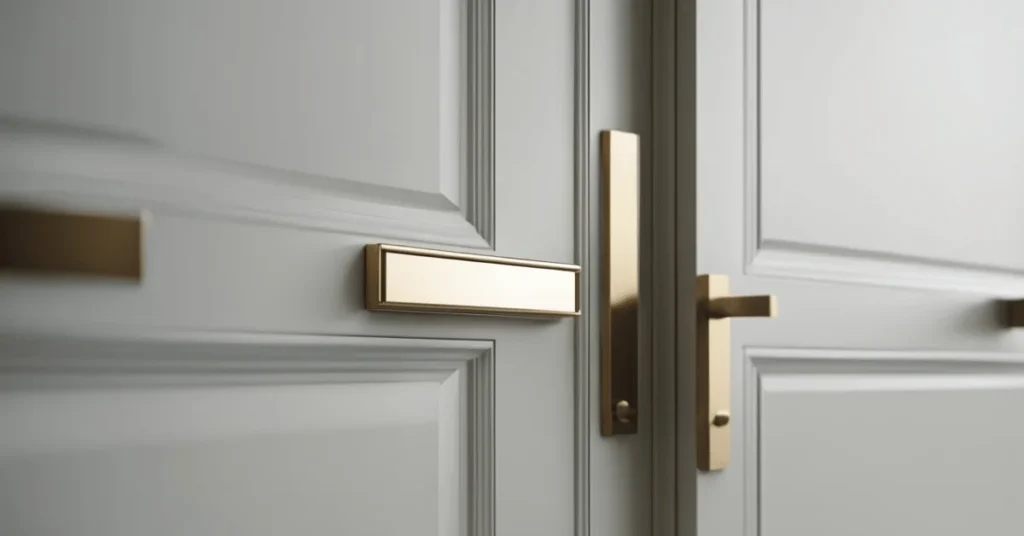
In modern interiors, door trim has evolved to become a key element with a focus on simplicity and sophistication. We will explore the defining characteristics, best practices for material selection, and the preferred color themes.
Defining Characteristics
Our approach to modern door trim emphasizes clean lines. We often recommend door trim styles that blend seamlessly with the wall, providing a sleek and unobtrusive look. Traditional door trim frequently includes ornate profiles and layered moldings, but modern styles are characterized by their flat, squared edges or subtly rounded profiles. Visually, this creates a streamlined effect that aligns with contemporary design principles.
Material Selection
When considering materials, Medium Density Fiberboard (MDF) is a popular choice due to its smooth finish and durability. Wood trim remains a classic option, and natural wood can be utilized to add warmth and a hint of texture. Meanwhile, MDF is well-suited for paint application, allowing for a consistent and refined finish. Our preferences lean towards materials that can maintain straight lines and resist warping over time.
Color Themes
The modern palette for door trims is often anchored in neutral colors. White is a common selection, offering a crisp and clean appearance that amplifies natural light. Conversely, black trim can provide a dramatic contrast, framing doorways with bold definition. When choosing colors, we gravitate toward those that complement the overall design without overwhelming the space. Neutral shades harmonize with various color schemes, affirming their versatility in modern interiors.
Integrating Door Trim in Home Design
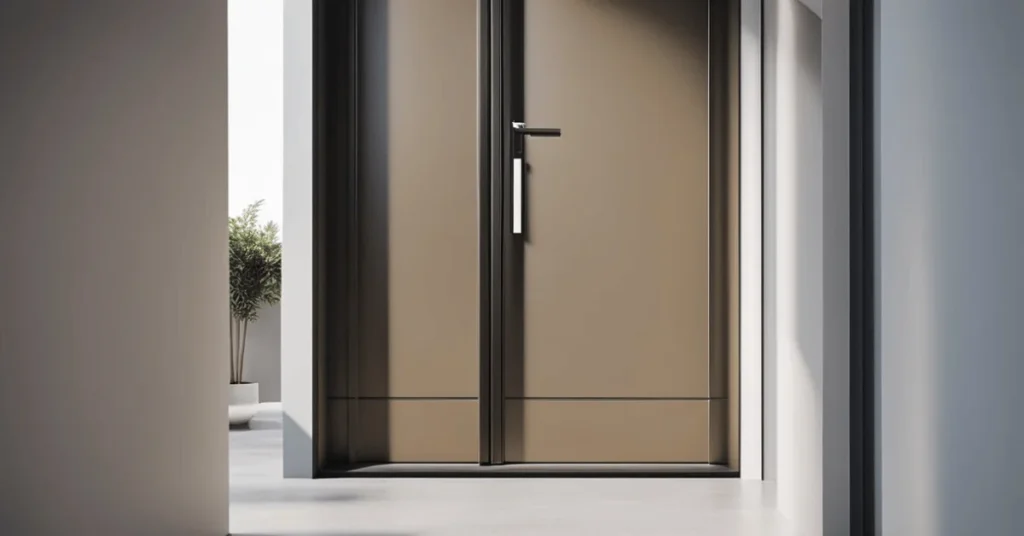
When we consider minimalist modern door trim, we’re focusing on how understated enhancements can significantly transform the interior design and overall home atmosphere.
Minimalist Effect on Various Rooms
We recognize that each room holds its own purpose and energy within a home. By choosing slim, clean-lined door trim, we accentuate the simplistic nature of minimalist design.
- Kitchen: In our kitchens, a minimalist trim can frame the area as one of nourishment and togetherness. Using straight, unadorned trim complements a modern kitchen’s sleek appliances and cabinetry.
- Bathroom: For the bathroom, which should be a haven of tranquility, less ornate trim circumvents visual clutter, which supports a more serene environment.
- Bedroom: Our bedrooms are sanctuaries of rest. A minimalist trim here allows the focus to remain on comfort and personal expression.
- Living Room: The living room serves as the central gathering space. We use minimalist door trim here to create a seamless transition between the living room and other areas, promoting a sense of flow and openness.
- Dining Room: In this formal space, the minimalist approach to door trim reinforces an atmosphere of elegance without overstating its presence.
- Office: A home office demands a design that fosters focus. Sparse trim can eliminate distractions, keeping the mind centered on productivity.
Minimalist Modern Door Trim and Home Aesthetics
Our approach integrates door trim as an integral component of home aesthetics, impacting the overall look and feel. By selecting the right door trim, we set the tone for the interior design.
- Interior Door Trim Ideas: We might recommend flat or panel profiles with subtle detailing to maintain the minimalist theme throughout the house.
- Home Design Inspiration: By incorporating slim door trims, we help maintain a continuous theme, tying the various elements of home design together.
- Material Selection: Choose materials that exhibit both functionality and aesthetic appeal, such as painted wood or MDF, to ensure durability and a flawless finish.
Through these carefully chosen elements, we help cultivate an interior that resonates with simplicity, class, and a timeless appeal. Minimalist door trim is more than a decorative feature—it’s a deliberate design choice that strengthens the cohesive language of our home’s design.
Installation and Maintenance Tips
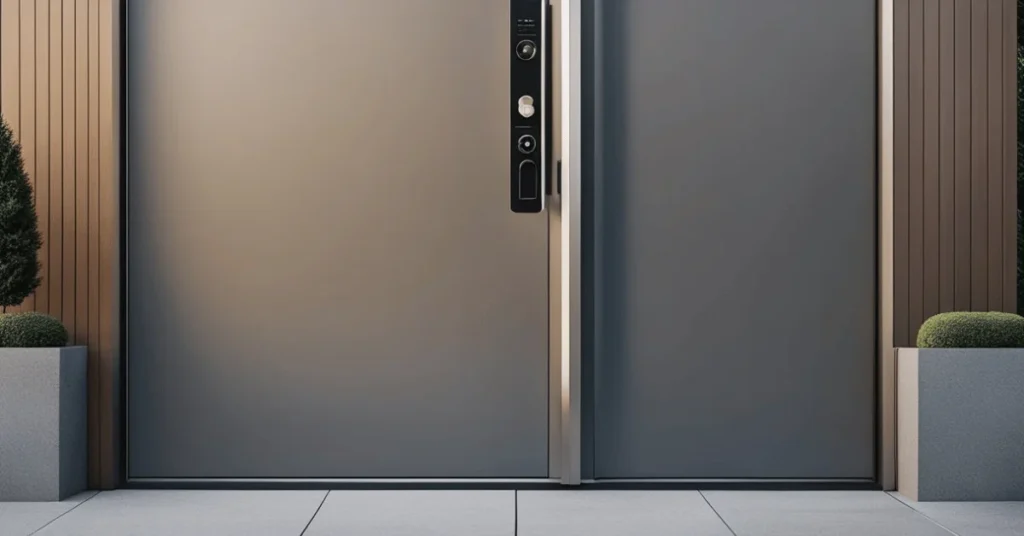
When installing minimalist modern door trim, we focus on the precision and the quality of materials to ensure a sleek appearance and durability. Consistent maintenance further upholds the trim’s elegance.
Proper Installation Techniques
To begin with, we ensure that our tools are precise and our method is meticulous to maintain the simplistic aesthetic of modern trim. We measure the door frame accurately and cut the trim material squarely to avoid unsightly gaps.
- Measuring: Use a reliable tape measure for accurate dimensions.
- Cutting: Utilize a sharp miter saw for clean, precise cuts.
For installation, we align the trim carefully with the door frame, checking for even placement on each side. We use high-quality adhesives or fasteners that will not compromise the trim’s material over time.
- Aligning:
- Vertical trims should be perfectly plumb.
- Horizontal trims should be level with the top of the door frame.
- Securing:
- Use finishing nails or appropriate adhesive.
- Fill nail holes with wood putty for a smooth finish.
Longevity and Care
To sustain the door trim’s minimalist appeal and ensure its longevity:
- Cleaning: We clean the door and trim with non-abrasive cleaners to avoid damaging the surface.FrequencyMethodBi-weekly or monthlyWipe with a damp clothAs neededMild detergent for stubborn dirt
- Painting: We choose door and trim colors that are not only high-quality but also resistant to fading. Opting for semi-gloss or satin finish paints makes cleaning easier and brings out the modern aesthetic.
In case of scratches or dents which may accumulate over time, we perform spot treatments and retouches immediately to prevent further damage.
- Spot Treatment:
- Sand the affected area lightly.
- Apply a matching paint or finish.
Consistent attention to these details during both the installation and ongoing care will ensure that our minimalist modern door trim remains a highlight in any remodeling project.
Exterior vs Interior Door Trim
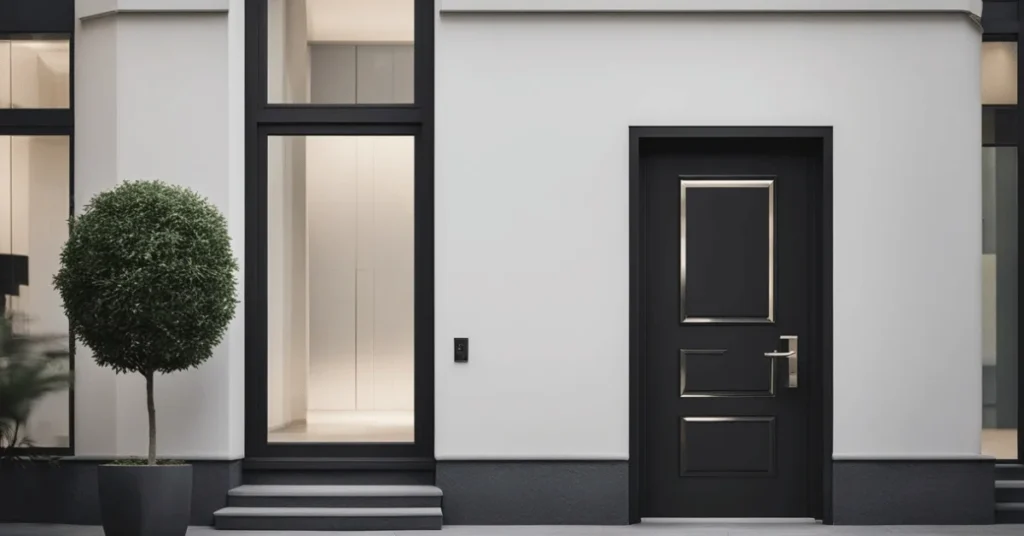
Selecting the right door trim is crucial for both aesthetic and functional purposes. We’ll explore the key differences between exterior and interior trim, helping you choose and style your door trim for modern homes effectively.
Understanding the Differences
Exterior Door Trim: Protection and Durability
- Materials: We use materials like PVC, composite, or treated wood that can withstand weather elements.
- Function: The primary function is to seal gaps to prevent water and air infiltration.
Interior Door Trim: Aesthetic Appeal and Continuity - Materials: Common materials include MDF, natural wood, or polystyrene.
- Function: Here, the focus is on creating a cohesive look that complements the interior design.
| Exterior Trim | Interior Trim |
|---|---|
| Weather-resistant materials | Aesthetic-focused materials |
| Seals against elements | Harmonizes with decor |
| Thicker for durability | Thinner for elegance |
Choosing Trim for Exterior Doors
When selecting trim for exterior doors, consider the architectural style of your home and the climate. We opt for broader and more robust trims to withstand external elements. For modern homes, we may choose a flat, streamlined trim that complements minimalist exterior design, considering how it will interact with outdoor lighting design to enhance curb appeal at night.
Features to Consider:
- Weather-Resistance: Essential for longevity.
- Compatibility with the Exterior Finish: Choose a trim that complements, not clashes.
Styling Interior Doorways
For interior doors, we focus on trim that resonates with the modern minimalist aesthetic. Our trim choices typically feature clean lines and minimal detailing. To further enhance the modern look, consider integrating trim with indirect lighting design, which adds a sophisticated ambiance.
Trim Styles for Interiors:
- Flat Trim: Simple and sleek, integrates with walls.
- Flush Trim: Trim sits level with the wall for a seamless look.
- Painted Trim: Often white or neutral, creating a crisp border.
Creative Elements in Door Trim
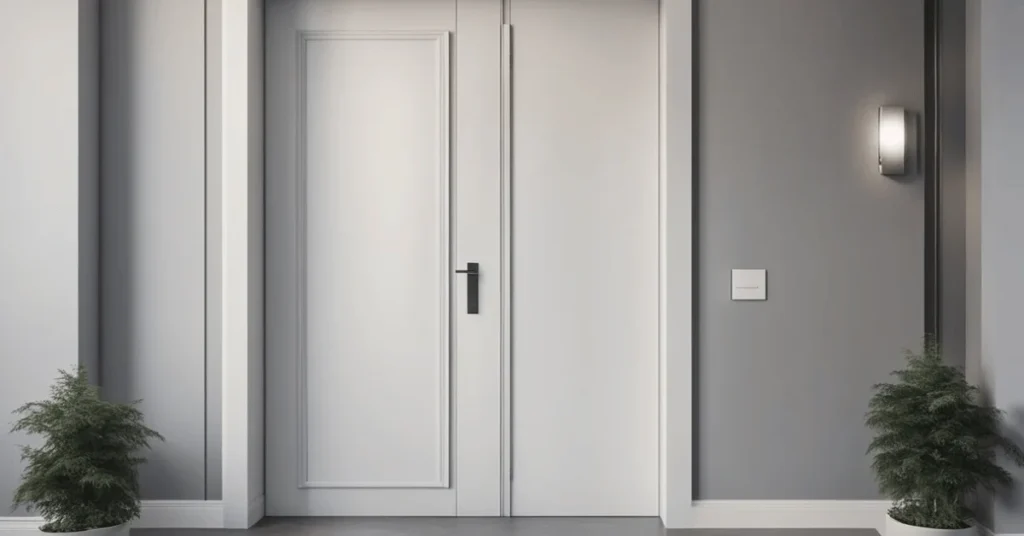
When we consider minimalist modern door trim, we focus on both form and function, emphasizing clean lines and subtle detail.
Innovative Trim Ideas
In the realm of minimalist door trim, innovation leans toward simplicity with a strong geometric presence. We prefer straight, crisp lines that can either blend seamlessly with the wall or provide a contrast for visual interest.
- Flush Door Trim: We can install trim that sits flush with the wall, making the doorway appear as if it’s part of the wall itself.
- Recessed Trim: To add a hint of depth without overwhelming detail, we sometimes recess the trim into the wall around the door frame.
Decorative Details
Decorative elements should serve to complement the door’s minimalist nature rather than overshadow it.
- Rosettes and Plinth Blocks: We often use rosettes and plinth blocks sparingly, primarily at the top corners or the base of the door frame, to add a subtle architectural touch without being too ornate.DetailDescriptionPlacementRosettesSmall, square or circular decorative elements.Top corners of trim.Plinth BlocksLarger, more pronounced blocks.Base of the door trim.
- Bevels and Handles: A slight bevel can offer a delicate shadow line that accentuates the trim, and the choice of handles can be a statement piece that offers both aesthetic and functional value.DetailFunctionBevelCreates a subtle shadow line.HandlesProvides visual and tactile interest.
In selecting corner blocks, a minimalist approach usually involves understated designs, ensuring that these elements do not detract from the door’s sleek appearance.
By integrating these creative elements thoughtfully, we develop minimalist modern door trim that elevates both the door and the space it inhabits, achieving the desired minimalist modern aesthetic.
Trendspotting in Door Trim
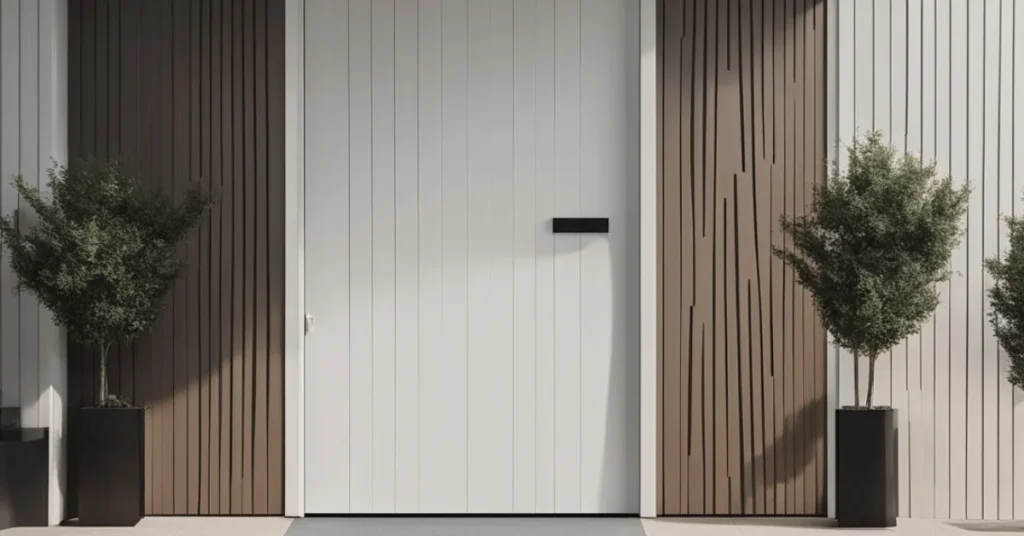
We’re seeing a push towards simplicity and elegance in minimalist modern door trim design, reflecting broader trends in interior decoration.
Current Trends and Popular Styles
Modern design principles guide us towards door trims that embrace clean lines and minimal ornamentation. Minimalist space concepts dominate, with architects and homeowners alike selecting trim styles that complement a space without overwhelming it.
| Trendy Door Trim Styles | Description |
|---|---|
| Flat Casing | A hallmark of contemporary style, flat casing offers a sleek, flush finish against the wall. |
| Flush with Wall | Door trim that’s installed flush with the wall exudes a modern, seamless look. |
| Bold Color Contrasts | Painting trims in bold, contrasting colors is a simple, modern touch that can highlight the minimalist design. |
| Natural Wood | In a nod to mid-century modern aesthetics, natural wood trims remain popular, bringing warmth and organic texture. |
Fusion of Different Eras
Our interiors often reflect a blend of influences, and we see this at play in the fusion of door trim styles. Mid-century modern meets contemporary in the combining of timeless materials with modern forms.
- Mid-Century Modern Meets Farmhouse: Incorporating the clean and simple lines of mid-century designs into the rustic, homespun feel of the farmhouse style creates a warm yet chic aesthetic.
- Contemporary Meets Traditional: While maintaining minimalist foundations, contemporary trims are borrowing subtle details from traditional designs for a touch of elegance and character.
This blending of eras allows for personalized spaces that respect the past while remaining squarely in the present.
Color Dynamics in Door Design
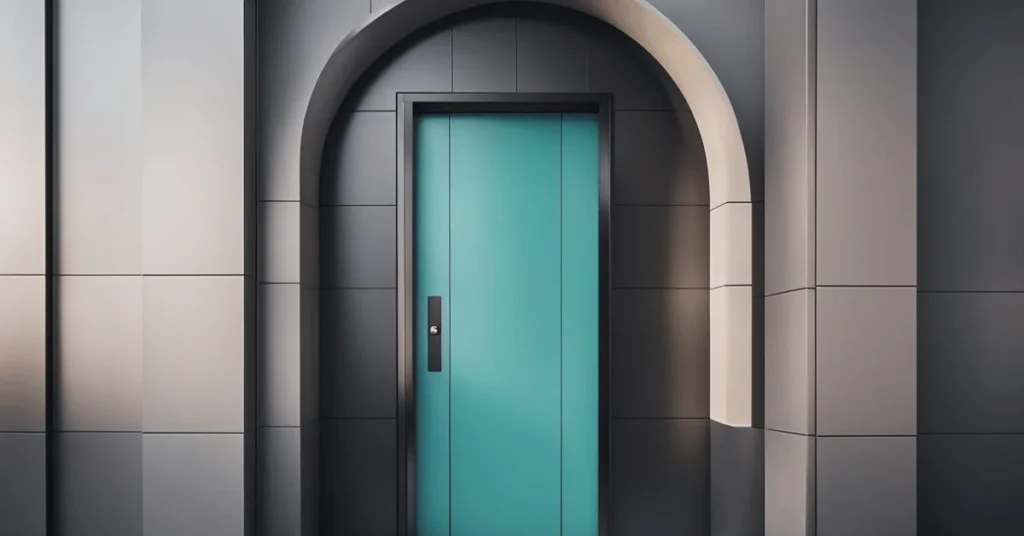
In minimalist modern interiors, the color of minimalist modern door trim plays a pivotal role in enhancing aesthetic harmony and visual interest. We will specifically discuss how contrasting colors and textures can make a door stand out and how neutrals contribute to the minimalist appeal.
Contrasting Colors and Textures
We observe that minimalist modern door trim in contrasting colors, such as a crisp white against a dark wood floor, creates a striking visual boundary that draws the eye. This technique is particularly effective in rooms where we want the door to act as a focal point. When paired with light wood flooring, a gray door trim provides a subtle contrast that can amplify the natural hues of the wood without overwhelming the senses.
- Examples of contrasting pairings:
- White trim with dark wood floor
- Gray trim with light wood flooring
Additionally, incorporating textures such as matte or satin finishes can further refine the contrast, bringing a tactile dimension to our design.
Neutrals and Minimalist Appeal
We embrace neutral door trims, which are staples of minimalist design, promoting a serene and uncluttered environment. Neutral colors like beiges, taupes, and off-whites harmonize with various elements of a room, including both dark and light wood flooring, without causing visual clutter.
- Neutral trim pairings:
- Beige trim with light wood flooring for warmth
- Off-white trim with a dark wood floor for brightness
These neutrals contribute to the minimalist appeal by blending seamlessly with the walls and floors, ensuring that the clean lines of minimalist design remain uninterrupted.
Regional Influences on Trim Design
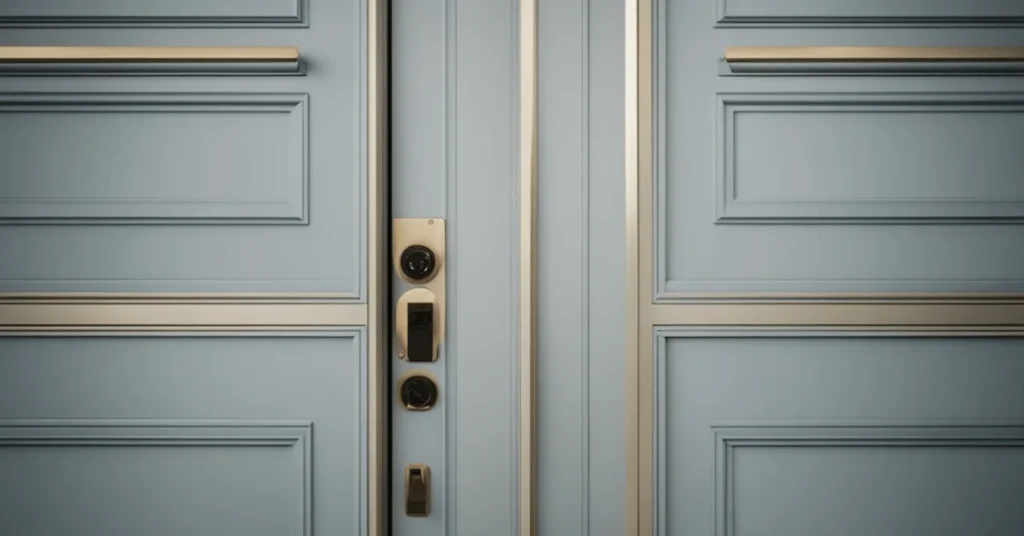
As we explore minimalist modern door trim, we recognize the significance of regional influences on design choices. We’ll examine how local décor trends and contrasting regional styles, specifically from Nashville and Miami, shape trim aesthetics.
Local Trends in Home Décor
Local trends significantly sway minimalist modern door trim designs. In regions where minimalism is at the forefront, we often see an emphasis on clean lines and subdued colors to match the area’s architectural ethos. For example:
- Nashville: Neutral tones and straightforward designs are prevalent, resonating with the city’s love for simplicity and natural materials.
- Miami: A tendency towards sleek, white finishes reflects the city’s modern, coastal vibe, with occasional pops of color.
Nashville Style vs Miami Mode
When comparing minimalist modern door trims from Nashville and Miami, distinct elements stand out:
- Nashville’s Trim:FeaturesDescriptionColor PaletteSoft, earthy, and often matte finishes.MaterialPredominantly wood, with a raw aesthetic.DesignUnderstated with subtle, intricate detailing as an homage to the area’s craftsmanship heritage.
- Miami’s Trim:FeaturesDescriptionColor PaletteBright, often using contrasts and high gloss.MaterialUses a mix of traditional wood and modern synthetic materials.DesignBold, with geometric shapes or art deco motifs that reflect the city’s vibrant architecture.
In Nashville, we put emphasis on tradition and craftsmanship within a contemporary framework, whereas Miami leans towards an energetic, forward-thinking approach. Both cities, while distinct in their stylistic preferences, contribute valuably to the overarching field of minimalist modern trim design.
Frequently Asked Questions
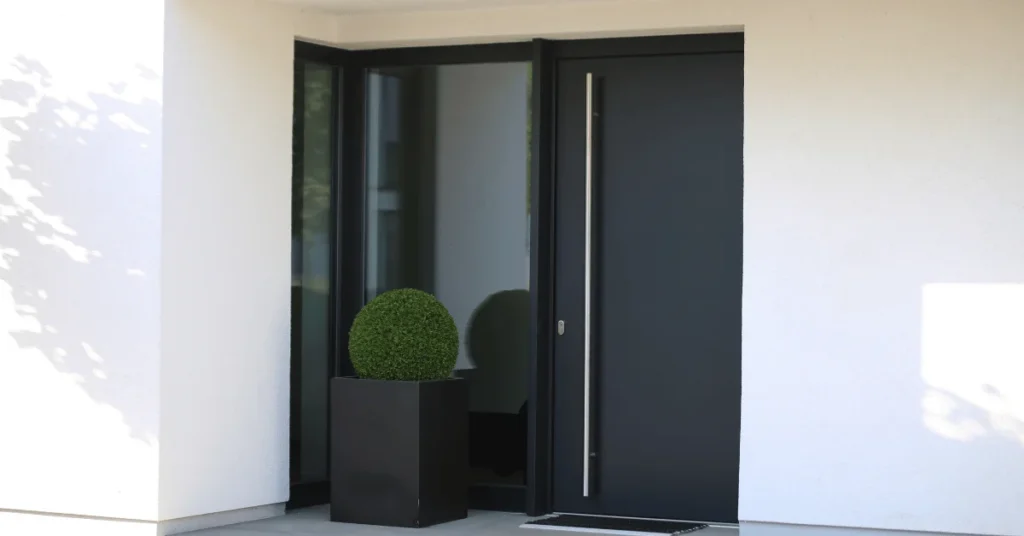
In our exploration of minimalist modern door trim, we address common inquiries to help you refine your space with sleek, contemporary style.
How can I implement minimalist modern door trim in a modern home exterior?
We recommend for a minimalist modern door trim to select trim with clean lines and flat profiles for the exterior. A seamless look can be achieved by painting the trim the same color as the façade or slightly darker to create subtle contrast without ornamentation.
What are some innovative interior door trim ideas for modern spaces?
Innovative ideas include flush trim with invisible fixings or magnetic strips that allow the trim to blend with the wall. Another idea is shadow gaps, which provide a recessed transition between the door frame and the wall, emphasizing sharp, linear details.
Could you provide examples of simple yet modern door trim designs?
Examples of minimalist modern door trim are flat-stock trims with square edges or recessed trims that sit flush with the wall. We also see trim-less doors where hardware is concealed, and the door appears to float within the opening, promoting a minimalist aesthetic.
How does door trim contribute to the minimalist aesthetic in home design?
Minimalist modern door trim contributes by framing doors in the simplest form possible. A minimalist approach often involves trim that is unobtrusive and doesn’t draw attention, either by being very thin or by aligning with the wall to enhance the sense of open, uninterrupted space.
What alternatives to traditional door trim are available for a modern minimalist door trim look?
Alternatives include using materials like metal for a crisp edge or implementing an integrated door system where the door and wall appear as one unit. Architectural reveals can also function as a transition between the door and wall without the need for protruding trim.
Which materials are preferred for a minimalist modern door trim and why?
Materials like MDF, aluminum, or steel are often chosen for their ability to be formed into precise, clean lines and their compatibility with modern finishes are perfect for a minimalist modern door trim. They are durable, stable, and can be finished in a variety of colors to complement minimalist design.
We’ve explored the elegance of minimalist modern door trim, but we’re eager to hear from you! Do you have any personal experiences or creative ideas for enhancing your space with minimalist modern door trim?
Share your thoughts and join the conversation in the comments below!

